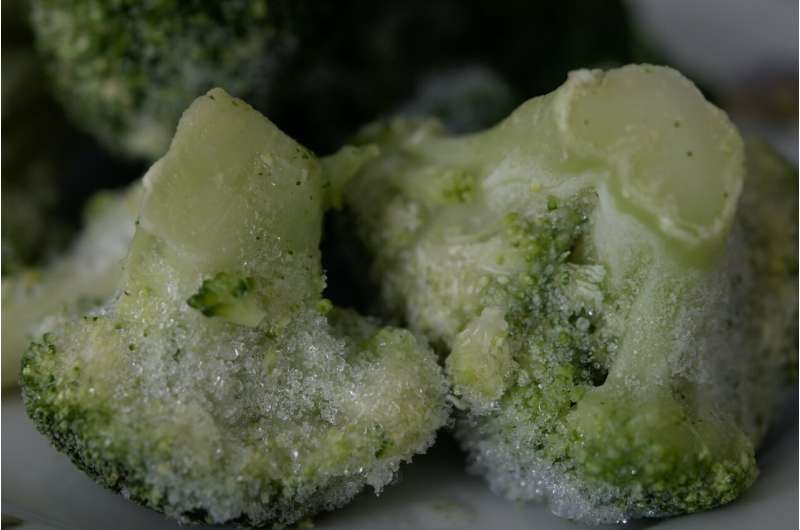This article has been reviewed according to Science X's editorial process and policies. Editors have highlighted the following attributes while ensuring the content's credibility:
fact-checked
peer-reviewed publication
trusted source
proofread
Broken-down soy proteins can stop damage from excessive ice build-up and freezer burn

Almost everyone has a bag of veggies shoved into the dark recesses of their freezer that's now essentially an unrecognizable block of ice crystals. And when thawed, foods damaged by excessive ice lose their texture and become mushy.
Now, researchers reporting in the Journal of Agricultural and Food Chemistry have shown that broken-down soy proteins can prevent ice crystal growth and could be especially useful for preserving frozen vegan foods or biological samples.
Some animals that live in extremely cold environments, such as fish in the deep polar oceans, make antifreeze proteins to keep the liquid in their bodies from freezing. These proteins slow down ice crystal formation and growth, a process that has piqued the interest of the frozen food industry.
Recently, researchers discovered that some peptides, which are pieces of broken-down proteins, can also slow ice crystal growth. However, all of the edible peptides tested so far have come from animal sources, including fish, pigs, chickens and cows. So, Tong Wang, Madison Fomich and colleagues at the University of Tennessee wanted to see if breaking down plant proteins could generate similar compounds with ice-crystal-inhibiting properties.
The team generated peptides from a commercially available soy protein isolate powder by exposing it to three different hydrolyzing enzymes: alcalase, pancreatin and trypsin. Each resulting mixture of peptides was also separated by size into multiple fractions.
All of the mixtures slowed ice growth in tests, but the ones produced from alcalase and trypsin were better inhibitors than those from pancreatin.
For all three enzymes, most of the activity came from the fraction with the largest peptides. The large-size fractions also ended up including some smaller peptides, which on their own didn't keep ice crystals from growing; however, the team showed that these small compounds boosted the activity.
This study is an initial step toward using soy-derived peptides as a natural, effective way to reduce the ice growth that can lead to freezer burn and thereby increase the shelf life of frozen goods, including vegan and vegetarian products, the researchers say.
More information: Ice Recrystallization Inhibition Activity of Soy Protein Hydrolysates, Journal of Agricultural and Food Chemistry (2023). DOI: 10.1021/acs.jafc.2c08701. pubs.acs.org/doi/10.1021/acs.jafc.2c08701
Journal information: Journal of Agricultural and Food Chemistry
Provided by American Chemical Society





















